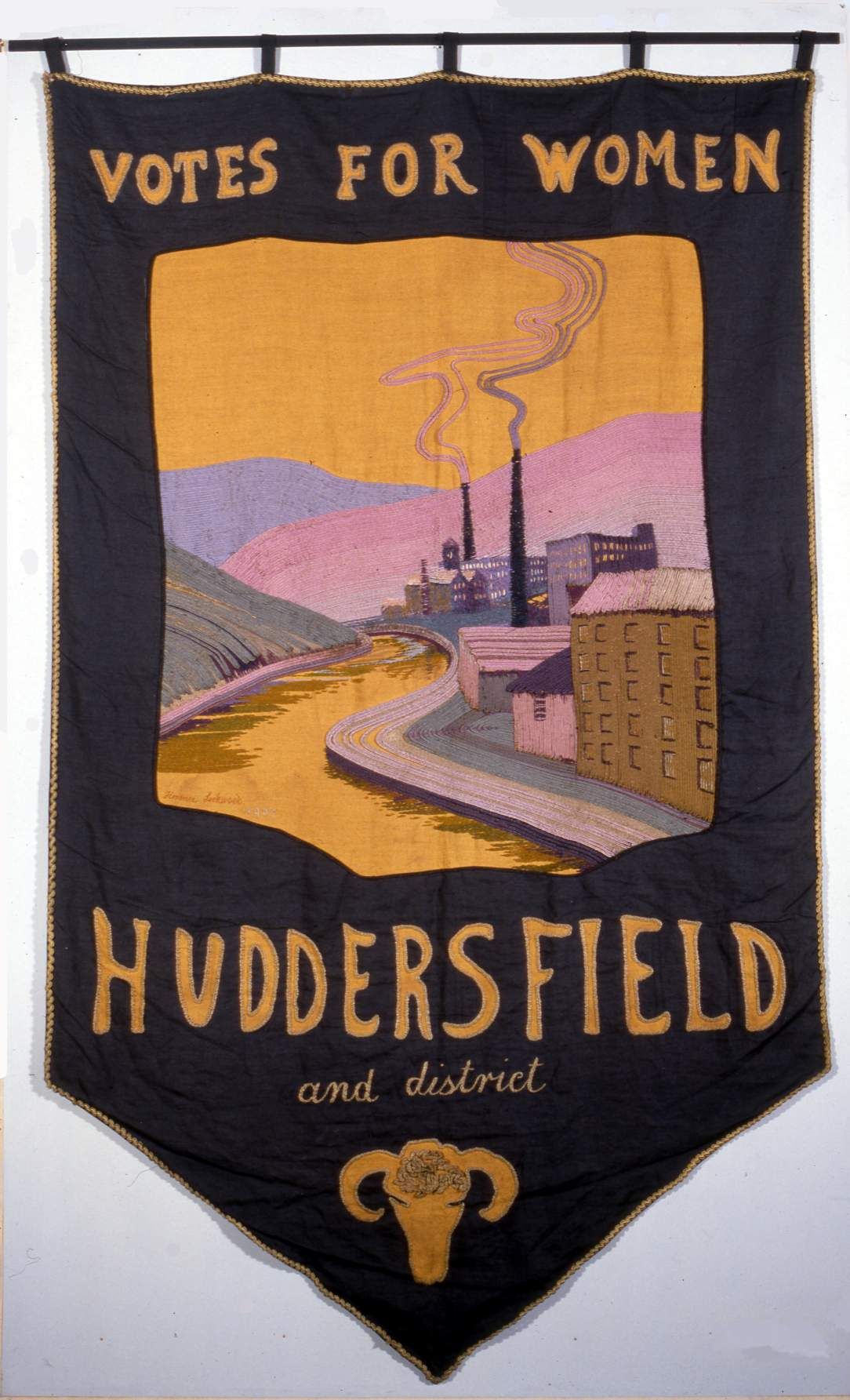In 1897, Millicent Fawcett founded the National Union of Women’s Suffrage Societies (NUWSS) to bring together different women’s suffrage groups across Britain. Unlike the more militant WSPU, the NUWSS welcomed men as members, and groups like the Men’s League for Women’s Suffrage also formed.
By 1914, the NUWSS had grown to 400 branches nationwide. The Union focused on peaceful campaigning methods such as petitions, processions, and marches to push for women’s right to vote.
Dewsbury and Batley
Support for women’s suffrage in Dewsbury began in June 1904, when a successful meeting led to the creation of a local society with around 100 members. Nearby, Batley also showed signs of progress. Although little is known about this early group, it highlights that local, grassroots support for women’s right to vote was present in the area well before national changes took place.
“Thursday (polling day) we had a regular field day, as we had a wagonette forenoon and afternoon, and drove round to nearly all the twenty polling stations in the division, displaying a banner with the strange device, "Electors! Remember women to-day." We also carried the poster "Coming in with the Tide." Our passing-by was hailed with waving of hats and hands, accompanied by cheers." From Women’s Franchise (30th April 1908) by Isabella Rowlett. This was regarding the Dewsbury Parliamentary by-election in 1908.
The Dewsbury branch of the National Union of Women’s Suffrage Societies (NUWSS) was founded in October 1909 at a meeting hosted by Miss Walker. Speakers included Mrs. Connon, Mrs. Parrish, and a visitor from New Zealand, where women already had the vote. The event generated local enthusiasm.
By 1912, the branch was active in public events, with support from local politicians and a regular column in the Dewsbury Reporter. Key organisers included teachers Edith Pickersgill and Ruth Law from Wheelwright Grammar School.
The branch continued to grow in 1913 and remained active during World War I. In 1917, it held a fundraiser for women’s hospitals, raising over £24 (£1,448 in today’s value). Dewsbury’s NUWSS branch played an important role in supporting the national campaign for women’s suffrage through education, activism, and community engagement.
Huddersfield
The Huddersfield branch of the National Union of Women’s Suffrage Societies (NUWSS) was founded in May 1904 as a non-party group. It united women from across the political spectrum who believed that women’s right to vote was a matter of justice. Miss Siddon led the branch, with Mrs. Studdard as secretary and Mrs. E. A. Beaumont as treasurer.
The branch was active in both local and national campaigns—organising public meetings, petitions, and supporting efforts in Parliament. In 1910, they convinced Huddersfield Town Council to back women’s suffrage.
They also promoted women’s involvement in local government and helped elect several women to public bodies by 1910. The group used events like plays, garden parties, and lectures to raise awareness and funds.
In 1909, they challenged women’s exclusion from national elections through legal test cases, which, though unsuccessful, helped highlight the injustice. The Huddersfield NUWSS stayed committed to peaceful, lawful campaigning to win the vote.
Emily Siddon
Emily Frances Siddon, born around 1844 in Mansfield to wealthy parents, became a leading figure in the women’s suffrage movement. When both her parents died before she was 21, she inherited property and moved to Honley House to live with her uncle, George Jessop, and his family. As a single landowner and employer, she had the independence and resources to support women’s rights and help others less fortunate. She used her position to become the founding president of the Huddersfield NUWSS branch, and her dedication and leadership led to her being appointed Vice-President of the national NUWSS in 1907.
She was one of the first women elected as a Poor Law Guardian in 1883, a role where she helped look after people in need and later went on to chair the Board of Guardians. During World War I, she led local support efforts for soldiers' families and was awarded an OBE (a national honour for important service) in 1918. In 1920, she became the second woman in Britain to be appointed a Justice of the Peace, a role in which she could help make decisions in local courts.
Emily Siddon was a trailblazer for women in both politics and public service. She used her position as a wealthy and independent landowner to support and lead local and national efforts to win the vote for women, helping to empower those with less social and economic privilege.
Florence Lockwood
“We are sick to death, we suffragists, of being told by men what we may do, ought to do, what is ‘womanly’." - Florence Lockwood
Florence Elizabeth Murray was born in 1861 in Plymouth and later moved to Linthwaite after marrying local Liberal Josiah Lockwood in 1902. She became involved in the women’s suffrage movement in 1907 after hearing Emmeline and Adela Pankhurst speak during a local by-election.
In 1907, the women’s suffrage movement came directly to Florence’s doorstep when Emmeline and Adela Pankhurst spoke at Linthwaite Fold during the Colne Valley by-election. Inspired to help, Florence chose not to support the WSPU’s anti-Liberal stance or socialist candidate Victor Grayson, instead joining the more moderate National Union of Women’s Suffrage Societies (NUWSS) alongside like-minded women.
She actively hosted meetings at her home and published a pamphlet in 1912 called The Enfranchisement of Women. Her most lasting contribution was designing a banner for the Huddersfield NUWSS branch.
Beyond suffrage, Florence played an active role in local politics. She became President of the Colne Valley Women’s Liberal Association and was elected Poor Law Guardian for Linthwaite. She campaigned on women’s issues and helped push for the creation of a local maternity hospital.
